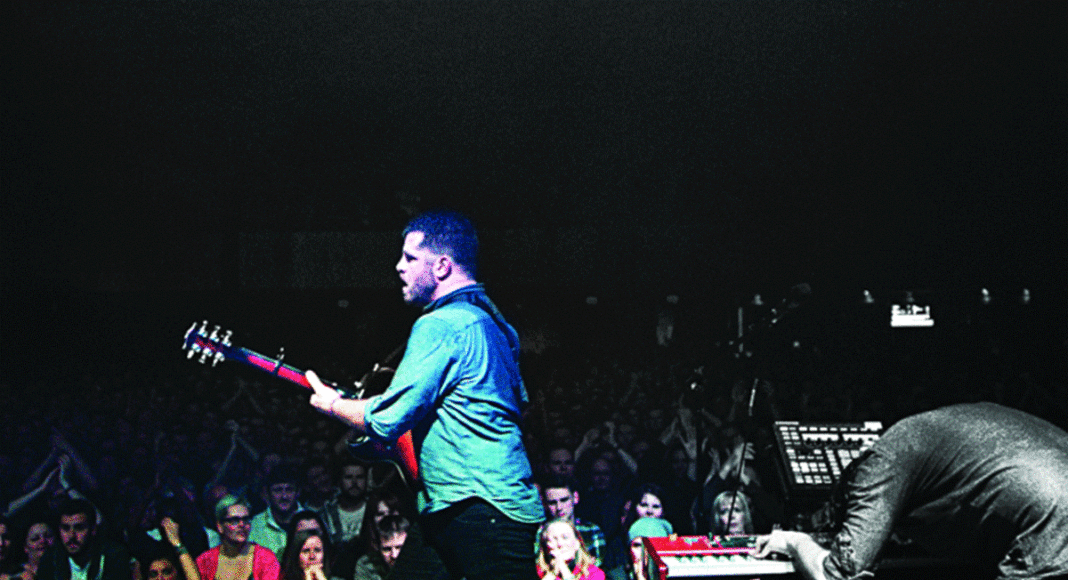“There’s a certain artifice to making a song. But there are certain things that go beyond artifice; there are certain things you can’t fake. And that genuine quality, that emotional honesty, that’s so evident from note one when Billy opens his mouth to sing. There’s no fourth wall. I mean, you are in there. He’s laying it all out on the table.”
—John Schaefer, WNYC DJ, in ‘Rise: The Story of Augustines’
The new music documentary Rise: The Story of Augustines starts with the Brooklyn rock band at the height of its success, appearing on The Late Show With David Letterman while riding a wave of acclaim and popularity after the release of the 2011 album Rise Ye Sunken Ships.
But pretty quickly, the film takes Augustines frontman William McCarthy all the way back to his childhood in scenes shot around the places he grew up in Santa Cruz County. It was a trip he wasn’t entirely prepared for.
“Oh my god, it was crazy,” McCarthy tells me by phone from London, where he’s just attended the sold-out screenings of the Rise world premiere at the Raindance Film Festival. “I grew up in Santa Cruz and Watsonville. We went back to my trailer park in Watsonville and found my trailer. It’s pretty weird when you see it in the movie; I’m huge compared to this trailer. But when I was a little kid, I didn’t even know it was a trailer. I didn’t know we lived in a trailer park! I just thought everyone’s houses had wheels on them.”
McCarthy speaks with a disarming mix of enthusiasm and glee that only adults who are still truly in touch with their inner child can manifest. It’s a quality that has fueled his best songwriting—first in the band Pela, which came up with the National and TV on the Radio in the early-2000s Brooklyn scene, and then with Augustines—allowing him to reach dizzying heights of confessional earnestness that connected with fans around the world. But reaching back to that younger self also has a lot of risks for McCarthy, who lays out the story of his difficult childhood in Rise: his mother struggled with schizophrenia and heroin addiction, which eventually led to her children being placed in foster homes. He and his brother James were relocated to Placer County.
“What was weird about Santa Cruz in the ’80s when I grew up was it was sort of this beautiful mellow beach town, but it also had this really gnarly darkness to it,” says McCarthy. “They took me away because my mother ended up being a panhandler in Santa Cruz. We could have stayed there, but I think they didn’t want us to see this underbelly any longer, because my mother had gotten completely swept up in it. I feel bad, because my sister went to high school in Santa Cruz, and she had to see my mom homeless. It’s heartbreaking to me.”
His mother committed suicide; he would eventually lose his brother to mental illness and suicide, as well, just as Pela was breaking up. How he came to channel the pain around his family tragedies into the album Rise Ye Sunken Ships—and especially the breakout anthem “Book of James”—is the story at the heart of Rise.
“It was difficult, because there were so many layers to the Augustines story,” says the film’s director Todd Howe. “You have a band that had a great record, and their live shows were undeniable, and there was a backstory to that record which had another couple of layers. When we made the decision to tell the story around the arc of the conception to the completion of Rise Ye Sunken Ships, I think that’s when it all kind of changed. Bill’s life story is part of that record, and the Augustines story really is from day one of Bill’s life.”
Howe and McCarthy became friends while Howe was lead guitarist for the London rock band the Boxer Rebellion. “When I met Todd, he was on the crest of his wave of success,” says McCarthy. “He’d been in this movie with Drew Barrymore [Going the Distance], and the whole premise of the movie was that Drew Barrymore and this guy meet at a Boxer Rebellion show. I didn’t really know anyone who had that going on with their band, so we had a lot to talk about. And then we toured together, and Todd was actually a really large part of getting Augustines going.”
After Howe got married and left the Boxer Rebellion when he moved to the U.S. in 2014, he decided he wanted to make a documentary about McCarthy’s life—though he had no filmmaking experience whatsoever.
“I woke up one morning, and that’s when it hit me: not only was it just a beautifully compelling story, but it had every element possible that would make it a great documentary, if I did it right and didn’t mess it up,” says Howe. “I made every mistake in the book, I learned how to make a film on this film, and I’m very thankful they had the patience to allow me so much time to make it.”
Rise is also a fascinating look into the perils of being an indie rock band in the 21st century. Because of his close relationships with not only McCarthy, but also the other members of Augustines, Eric Sanderson (who had also been in Pela) and Rob Allen, Howe was able to elicit stark and compelling insights in his interviews.
“They really did not hold back,” says Howe. “They all wear their hearts on their sleeve. It’s all out there.”
What emerges is a portrait of a band that swings between desperation and exhilaration. There are times (in the Pela years, at least) when they are selling out shows they can’t afford to get themselves to. There are people telling McCarthy that his songs saved their lives, even as he struggles to figure out if Augustines can afford to continue. But looking back, McCarthy believes the intensity of those times also made it possible for him to write songs like “Book of James.”
“Whenever you’re doing art because you have to, when you’re doing art to survive, you’re getting so close to the essence of expression. Because it’s not, ‘Well, on the weekend if I get around to it, if I have some spare time, I’ll do it,’” he says. “It’s ‘I have to do this, otherwise I think a part of me will die.’ It’s a completely different energy. That song was written with that kind of energy.”
It’s also what makes the band’s story so inspirational, says Howe. “I love the lyric ‘Let go of all your ghosts, or more will come around,’” he says, quoting the Augustines song “Now You Are Free. “And Bill also said that you can’t be married to struggle, you have to keep a little bit of yourself open to the possibility that you might get to where you always wanted to go.”
RISE: THE STORY OF AUGUSTINES will have its U.S. premiere at the Santa Cruz Film Festival at 9:15 p.m. on Saturday, Oct. 6 at the Courtyard Theater at the Tannery Arts Center. William McCarthy and Todd Howe will be in attendance. For more information, go to santacruzfilmfestival.org.
Don’t miss our top 5 picks for the 2018 Santa Cruz Film Festival.














We were lucky enough to see Billy play an intimate pop up gig in a village pub in Yorkshire (UK) around 2 months ago. Having seen him play with Augustines more than a dozen times between 2012-16 it was a night of complete & utter joy to witness him, sat right in front of just 30 of us, singing his heart out as though performing in front of 3000. He is, as the band were, the best live act we will ever see and cannot wait to see the film.